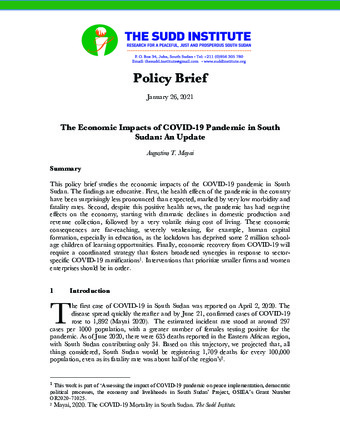The Economic Impacts of COVID-19 Pandemic in South Sudan: An Update
Publication Summary
This policy brief studies the economic impacts of the COVID-19 pandemic in South Sudan. The findings are educative. First, the health effects of the pandemic in the country have been surprisingly less pronounced than expected, marked by very low morbidity and fatality rates. Second, despite this positive health news, the pandemic has had negative effects on the economy, starting with dramatic declines in domestic production and revenue collection, followed by a very volatile rising cost of living. These economic consequences are far-reaching, severely weakening, for example, human capital formation, especially in education, as the lockdown has deprived some 2 million school-age children of learning opportunities. Finally, economic recovery from COVID-19 will require a coordinated strategy that fosters broadened synergies in response to sector-specific COVID-19 ramifications. Interventions that prioritize smaller firms and women enterprises should be in order.
Augustino Ting Mayai's Biography
Augustino Ting Mayai is the former Managing Director of the Sudd Institute. He is a founding Research Director of the same institution, serving in this capacity for a decade. He holds a Ph.D. in Sociology, with concentrations on demography and development from the University of Wisconsin-Madison. He currently studies how state effectiveness affects child health outcomes in South Sudan and Ethiopia. Dr. Mayai has written extensively on South Sudan’s current affairs. August is the current Chair (Statistician General) of the National Bureau of Statistics, Government of South Sudan.

